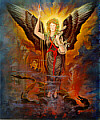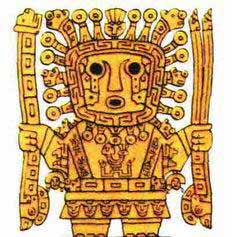http://watch.pair.com/scorpio.html
SCORPIO
THE SERPENT HOLDER
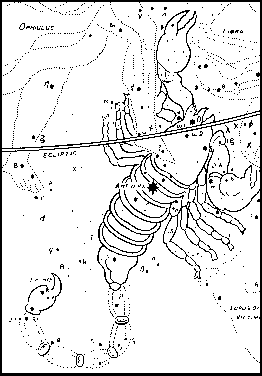
Beloved, believe not every spirit, but try the spirits whether they are of God: because many false prophets are gone out into the world. Hereby know ye the Spirit of God: Every spirit that confesseth that Jesus Christ is come in the flesh is of God: And every spirit that confesseth not that Jesus Christ is come in the flesh is not of God: and this is that spirit of antichrist, whereof ye have heard that it should come; and even now already is it in the world. I John 4:1-3
GNOSTIC DUALISM
Gnosticism—a synthesis of Jewish occultism and Christianity—was a deadly heresy that originated in Alexandria, Egypt, and posed a serious threat to the early Christian Church. During the Middle Ages, the Inquisition was directed largely at Gnostic sects such as the Templars, Cathars, Albigenses, Bogomils, and the Donatists. Although these groups were eradicated by the Church of Rome, the secret doctrine which they represented was carried forward by a myriad of secret societies spawned by the Invisible College of the Order of the Rosy Cross during the 17th century Rosicrucian Enlightenment.
Today, demons posing as reincarnated Cathars are insisting that their heresies are the true doctrines of Christianity. Dr. Arthur Guirdham, author of The Great Heresy, claims to be in contact with people living today who died in the Albigensian Crusade. According to The Encyclopedia of New Age Beliefs, "The spirits Dr. Guirdham contacts claim to be people who lived as Cathars in the thirteenth century, who now demand he revive their beliefs as true Christianity." (207:87) According to Dr. Guirdham, one of these beliefs was denial that Jesus came in the flesh:
"...the Templars had similar ideas on the Incarnation those of the Cathars. The latter could not accept the orthodox Christian interpretation. To them the Son of God could not be imprisoned, and could not die, in matter. The Cathar detestation of the crucifixion was notorious. The Templars' contempt for the Cross was merely another version of it." (1003:91)
The Cathar belief was a revival, or rather a continuation, of the Valentinian heresy which denied that Jesus Christ came in the flesh. Irenaeus of Lyons (120-202 A.D.) dealt extensively with the errors of Valentinus in his treatise, Against Heresies, an account and refutation of the multiform Gnostic heresies which prevailed in the latter half of the second century Specifically, Irenaeus addressed the Valentinians' false doctrine which denied the Incarnation of Jesus Christ: "...they deny that He assumed anything material [into His nature], since indeed matter is incapable of salvation." (1006)
This anti-Christian doctrine is based on the dualistic belief that in the Universe there are two equal forces which oppose each other in a continual conflict, and that the outcome of this conflict is unknown until the very end. Dualists believe that there was a good God who created the Universe, however, an evil Demiurge, an emanation of the true God, created the physical Earth, which is inherently evil. Whilst dualistic Gnostics believe that matter is evil and Spirit is good, monistic Gnostics regard matter not as evil, but as an illusion. To them, the material realm does not really exist, but is a figment of the human psyche. Both dualistic and monistic groups believe that the destiny of the spiritual man is to be released from entrapment in the body (matter) into the Spirit realm. Since matter is evil and the body is material (or non-existent) the pathway to release from the prison of matter, or the illusion of a material realm, is through strict asceticism. Some gnostic sects even teach that moral conduct is irrelevant, since the body is an illusion or, if they believe in matter, that the flesh will eventually be destroyed.
Gnostics maintain that primitive man was a microcosm of the universe; however, mankind strayed far from his primitive spiritual state when he descended into matter. According to this heresy, as articulated by H.P. Blavatsky in Isis Unveiled, the fall of man was not disobedience to God's command, but his descent into matter.
"The first races of men were spiritual, and their protoplastic bodies were not composed of the gross and material substances of which we see them composed now-a-day. The first men were created with all the faculties of the Deity, and powers far transcending those of the angelic host; for they were the direct emanations of Adam Kadmon, the primitive man, the Macrocosm; while the present humanity is several degrees removed even from the earthly Adam, who was the Microcosm, or 'the little world'." (195:276) (Vol. II)
Because they perceive the physical realm to be evil, the Gnostics are collectively involved in a program to transform the natural condition of mankind. Gnostic salvation is not merely individual redemption of each human soul; it is a cosmic process. It is the return of all things to what they were before the fall of Adam-Kadmon into matter. Irenaeus wrote, "They further hold that the consummation of all things will take place when all that is spiritual has been formed and perfected by Gnosis (knowledge); and by this they mean spiritual men who have attained to the perfect knowledge of God, and been initiated into these mysteries by Achamoth [the Æon Wisdom-Sophia or female principle]. And they represent themselves to be these persons." (1006)
Gnostics claim that mankind was on the path of salvation, courtesy of the Nephilim, until the Atlantis cataclysm. Peter Dawkins, a recognized authority on the Rosicrucian philosophies and Ancient Wisdom teachings, wrote in his book Arcadia: The Ancient Egyptian Mysteries, that ancient Egypt was an alchemical experiment to reproduce the mystical culture of Atlantis. There the Hermetic science of alchemy was given by the gods of Atlantis to recover the lost arts and sciences of the drowned pre-flood civilization. Exoterically, alchemy consists of laboratory experiments to transform base metals into gold; esoterically, however, the alchemist aspires to discover the elixir of life that will transform man from his mortal condition to the state of immortality, signified by gold because of its indestructibility. Dawkins explains that the true alchemy—the transmutation of the material state to the perfect spiritual state—is accomplished through the process of initiation:
"Just as nature, or a gardener, has to turn the earth into a rich dark compost in order that any seed planted therein will grow into a strong and healthy plant, so it is that the natural soul of man needs to prepare the soil of his own nature until it too becomes a rich compost in which the seed of his spiritual self may become well bedded, and from which it may grow strongly and healthily through the stages of initiation to reach its ultimate perfection. This rich compost is known as the Prima Materia or 'First Matter' - the starting point of all initiation. The Egyptian word for it was Kemit ('the black earth'), and this is one of the names they gave to their country. The Greeks knew this name as Khemia, from which we derive our word 'chemistry' and, more particularly, 'alchemistry' - the chemistry of the 'all' or whole being. The Hermetic science is founded upon this Kemit. Alchemy is the process of initiation that leads the natural soul from the state of Kemit to a condition in which it is transmuted into the 'golden' state of the spiritual soul." (889:36)
According to Blavatsky, the fall of the heavenly Adam-Kadmon, the angelic androgyne, into dense matter and its division into sexes resulted in the transformation of the world from a formerly spiritual and ethereal state into its present material condition. This cataclysmic fall of the first Adam into matter was reflected in the heavens by a change in the sign Virgo-Scorpio; "the pure Virgo is separated, and falling 'into generation,' or the downward cycle, becomes Scorpio emblem of sin and matter." (209:502ff). Scorpio, however, states Fred Gettings in The Secret Zodiac, still retains a dual image—the eagle and scorpion—a duality which represents the two natures of man:
"The eagle of St John is the eagle of Scorpio, which sign (alone of all the twelve) has two images, the eagle the symbol of the redeemed and spiritualized Scorpionic nature, the scorpion its fallen, unredeemed and earth-bound nature." (911:43)
Apparently because of its primordial role as the consort of Virgo, the Great Mother Goddess and archetype before Isis, the astrological sign of Scorpio will preside over the restoration of mankind to its previous spiritual state. Occult sources seem to agree on this, that a 'transformation' of the whole wide world—a release from entrapment in matter—will occur during the sign of Scorpio:
"It is through the gateway of Scorpio, aided by the Lords of Form, that humanity will come to its final conclusion in the Old Earth and move through the door of the temple into the Grand Way of the New Earth Star. When the earth is under the Zodiacal influence of Scorpio the Zodiacal threshold which emanates through that sign into the earth triggers a series of celestial programs of return, facilitating the earth in 'dropping the frame' as the ancients used to say. This allows the earth to move into a new and more etherealized formation. In time, this will result in the earth's ascension into the New Earth Star." (914)
The earth is utterly broken down, the earth is clean dissolved, the earth is moved exceedingly. The earth shall reel to and fro like a drunkard, and shall be removed like a cottage; and the transgression thereof shall be heavy upon it; and it shall fall, and not rise again. - Is. 24:19-20
Thy wrath is come, and the time of the dead, that they should be judged, and that Thou shouldest...destroy them which destroy the earth. - Rev.11:18
TRIBE OF DAN: EAGLE OR SCORPION?
The emblem of the tribe of Dan was the serpent, in fulfillment of Jacob's prophecy in Genesis 49:17: "Dan shall be a serpent by the way, an adder in the path, that biteth the horse heels, so that his rider shall fall backward." However, the prince of the tribe of Dan replaced the serpent with an eagle.
"To Dan was given the symbol of Scorpio, which, in the ancient Egyptian zodiac was a snake. However, when the time came to hoist the symbol of the snake, Ahiezer refused and chose instead the symbol of an eagle. According to Unger's Bible Dictionary:
'Dan's position in the journey was on the north of the Tabernacle, with Asher and Naphtali. The standard of the tribe was of white and red, and the crest upon it, an eagle, the great foe to serpents, which had been chosen by the leader instead of a serpent, because Jacob had compared Dan to a serpent. Ahiezer substituted the eagle, the destroyer of serpents, as he shrank from carrying an adder upon his flag. It may prove worthwhile to consider the possible connection to the tribe of Dan whenever an eagle is used as the symbol of subsequent leaders or nations.' " (127:117)
In the 12th century, a Jewish writer in Spain whose works influenced the Kabbalah, named Antares, the brightest star in Scorpio, "Kesil" or "Akrabh" the crowned serpent. By this designation, Aben Ezra indicated that Jews understood the serpent to be the actual emblem of Dan.
"Sir William Drummond asserted that in the zodiac which the patriarch Abraham knew [Scorpio] was an eagle...
"Aben Ezra identified Scorpio or Antares, with the Kesil; although that people generally considered these stars as a Scorpion, their Akrabh, and, it is claimed, inscribed it on the banners of Dan as the emblem of the tribe whose founder was 'a serpent by the way.' When thus shown it was a crowned snake or Basilisk." (927:362)
Yair Davidy of Brit-Am Israel, a British-Israelite organization, associates the tribe of Dan with the British commonwealth nations, in particular the United States. Based on Genesis 49:16, Dan shall judge his people, as one of the tribes of Israel, Davidy deduces that Danites dominate the legal profession in the U.S. This is actually meant as a commendation of the Tribe of Dan!
“The name DAN means 'judge' in Hebrew. Many lawyers and judges in the USA are of Irish descent of a particular type as is much of the police force... Descendants of Dan today appear to be concentrated in Ireland, Britain, the USA, and especially Denmark.” (264)
|
|
It seems that the Great Seal of the United States, as originally proposed, displayed a rising Phoenix instead of an Eagle. The design that was at length accepted by the Congress dispensed with the Phoenix in preference for an Eagle that was rising. David Ovason wrote of this historic but relatively unknown event in The Secret Architecture of the Nation's Capitol:
"...if one is going to study the arcane background to the formation of the United States, one should start with the eagle, which is also the heraldic bird on the obverse of the Seal of the United States of America. This fearsome-looking bird, so widely used in the symbolism of the States, is what esotericists have called an 'open mystery': by contrast the eagle as used by the early Masons, and by the Rosicrucians and alchemists before them, was an 'occult blind'. This means that it was designed to carry an open symbolism acceptable to the uninitiated, yet, at the same time, to hide a more profound meaning accessible only to those familiar with arcane symbolism.
"The eagle originally proposed for the Seal of the United States was not an American (or bald-headed) eagle, but was crested. Furthermore, from descriptions and drawings left by William Barton, we see that at one time he had proposed not only an eagle, but also a phoenix, which later gave rise to many misunderstandings in both Masonic and arcane literature. When, in 1782, Charles Thompson was invited by Congress to revise the design, he insisted that it be an American eagle, not displayed, but rising. The phoenix was forgotten, as were many other elements in William Barton's design. Thompson also introduced the bundle of arrows (in the sinister talon) and an olive branch (in the dexter)."(512:218-19)
William Barton's first and second designs for the Great Seal, discreetly rejected by Congress, displayed a Phoenix in a nest of Flames.
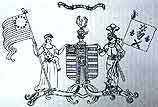
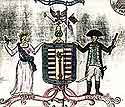
What is the significance of the Phoenix in Barton's design? "Carl Jung points out that the alchemists often spoke of 'killing with the sword'. This was the sword used to separate the elements, thus bringing back the original state of 'chaos' in order that a newer and more perfect body may be created. This is similar to the image of the Phoenix which allows itself to be destroyed by fire and then arises anew out of its own ashes." (258:82)
This mythical bird rising from a nest of flames is the symbol of Scorpio and the process of transformation which can only be undertaken under this astrological sign. The Phoenix is a symbol of the occultist's consuming passion for release from the bondage of matter and reunion with the universe, whence he believes he originated and believes to be a living and divine organism.
"The Lemurian symbol for Scorpio was a winged creature, part bird and part serpent, lifting Phoenix-like from a nest of flames. This was the Gheza, the mythic being involved both in the illusion of form and in the process of transformation simultaneously. This creature was to represent the intrinsic role of matter when thrust into the realm of form...
"The cry of Scorpio to the ancients was 'feed me, for I feed the flame!' It was a sign representing the insatiable hunger of the soul to absolve the bonds of form and embrace the eternal formless self; to merge with the universe in the bliss of divine reunion. It is through the gateway of Scorpio, aided by the Lords of Form, that humanity will come to its final conclusion in the Old Earth and move through the door of the temple into the Grand Way of the New Earth Star. When the earth is under the Zodiacal influence of Scorpio the Zodiacal threshold which emanates through that sign into the earth triggers a series of celestial programs of return, facilitating the earth in 'dropping the frame' as the ancients used to say. This allows the earth to move into a new and more etherealized formation. In time, this will result in the earth's ascension into the New Earth Star." (914)
A Phoenix in a nest of flames on the Great Seal of the U.S. would have alerted God-fearing Americans to the Judeo-Masonic character of their government and its anti-Christian agenda—the planned destruction, not only of the United States, but also of the world, in order to make way for the Judeo-Masonic Novus Ordo Seclorum (New World Order). Gnostic occultists know that the transition into their New World Order will not be a smooth process; to the contrary, such a drastic reversal of the social order requires the planned destabilization and destruction of established structures. Controlled conflicts and local wars must escalate into regional wars until World War III erupts, producing global chaos and destruction of the old order.
"...[T]he alchemist held [Scorpio] in high regard, for only when the sun was in this sign could the transmutation of iron into gold be performed. Astrologers, on the other hand, although they considered it a fruitful sign, 'active and 'eminent', knew it as the accursed constellation, the baleful source of war and discord, the birthplace of the planet Mars..." (927:363)
According to Brian Williams' A Guide to the Renaissance Tarot, "Scorpio is also known as the Sparrowhawk or Phoenix." (983) The Dictionary of Symbolism states, "Traditionally Scorpio has been associated with male sexuality, destruction, the occult, the mystical, illumination and...healing and resurrection." (100:301) In Greek mythology, the Scorpion was the agent of divine vengeance.
"In ancient Greek tradition, the Scorpion avenged Artemis (the Roman Diana), the eternally youthful virgin huntress, archetypal man-hater. Offended when Orion offered violence to her, the goddess had a scorpion sting him in the heel. For his services, the scorpion was turned into a constellation. Orion was also sent up to Heaven and became a constellation, too. This resulted in the saying that 'Orion is constantly running away from the Scorpion'... The Scorpion in this context was regarded as the instrument of divine vengeance." - 66:836
To this day, the scorpion is said to be the archenemy of the constellation Orion for whenever Scorpio rises in the East, Orion sets in the West: "...Orion was placed among the stars in such a way that when Scorpio rises, Orion sets." (570:188) Orion, the Hunter is the heavenly representation of the earthly Nimrod, "a mighty hunter before the Lord"—whose spiritual deception of the post-flood civilization was frustrated by God, who is consequently vilified as Scorpio. (Gen. 11:1-9) This interpretation of Scorpio is presented by Alexander Hislop in The Two Babylons, which also identifies the constellation Orion and Babylonian god, Nimrod, as the Egyptian god, Osiris:
"The name of a scorpion in Chaldee is Akrab; but Ak-rab, thus divided, signifies 'THE GREAT OPPRESSOR,' and this is the hidden meaning of the Scorpion as represented in the Zodiac. That sign typifies him who cut off the Babylonian god, and suppressed the system he set up. It was while the sun was in Scorpio that Osiris in Egypt 'disappeared' (WILKINSON), and great lamentations were made for his disappearance. Another subject was mixed up with the death of the Egyptian god; but it is specially to be noticed that, as it was in consequence of a conflict with a scorpion that Orion was 'added to the stars,' so it was when the scorpion was in the ascendant that Osiris 'disappeared'." (156:57)
The sign of Scorpio, which epitomizes the evil agency of Orion/Nimrod's demise, has persisted in confounding the Babylonian enterprise—the Tower of Babel—in much the same way that Scorpio bites Orion. This adversarial state of affairs characterizes any number of fabled conflicts between heroes and various reptilian beasts in ancient and classical mythology. Whatever opposes the worship of Lucifer may expect to be portrayed as a serpent, dragon, scorpion, etc. On another level, the scorpion represents human nature and the religious systems that stand in the way of its spiritual transformation via gnosis:
"Liz Greene, in her book, The Astrology of Fate...equates Scorpio with the archetypical theme of the hero facing the dragon. Examples of this theme include the stories of Heracles battling the Hydra, Siegfried and the dragon Fafnir, and even Perseus and the Gorgon Medusa. The reptilian dragon represents instinctual side of human nature in its terrifying and destructive power." (984)
We note here the significance of the fact that the tribe of Dan changed its God-given emblem from the serpent to the eagle. "Ahiezer substituted the eagle, the destroyer of serpents, as he shrank from carrying an adder upon his flag." (127:117) Instead of acknowledging Jacob's prophetic word that Dan would fulfill the role of a serpent, the dragon identified as Satan in Rev. 12:9, this rebellious tribe would posture as the hero who slays the scorpion/dragon!
There is abundant evidence that the Merovingians descended from the Tribe of Dan, which has, indeed, has risen to a position of global power from which Dan shall sit in judgment. We refer to reader to other reports this website dealing with the Tribe of Dan, The Merovingians, and the Noahide Laws.
In Bloodline of the Holy Grail, the creed of the Druids—"Truth against the world"— is illustrated as a winged woman holding a coiled serpent and standing on what appears to be a winged serpent or dragon: |
|
The name kundalinî means "she who is coiled" and is believed to be the "serpent of life, fire, and wisdom." Also called serpent power and Goddess energy, Kundalini is said to lie dormant in the uninitiated but, when awakened, releases an infinite storehouse of divine energy and consciousness. This so-called agency of spiritual transformation and enlightenment is liberated through programs such as Tantra-Yoga. Sadomasochistic exercises prepare the initiate for the harrowing ordeal of kundalini, an experience that is compared to death.
"In keeping with this typically Tantric symbolism, the Gheranda-Samhitâ (3.45) specifies that the yogin engaged in this esoteric practice should besmear his body with ashes, which is an outward sign of his internal renunciation of all worldly things and desires. The adept who seeks to arouse the kundalinî must be prepared to die, because this process quite literally anticipates the death process. As the serpent power rises along the central passage, the yogin's microcosm is gradually dissolved." (987)
The triumphant woman who holds the therapeutic serpent of wisdom and healing is a figure similar to the constellation which is above Scorpio —Ophiuchus, the Serpent Holder, also called Serpentarius. In the astrological traditions, Ophiuchus tramples on Scorpio and, having received the elixir of life from the Serpent, restores Orion to life.
OPHIUCHUS, THE SERPENT HOLDER
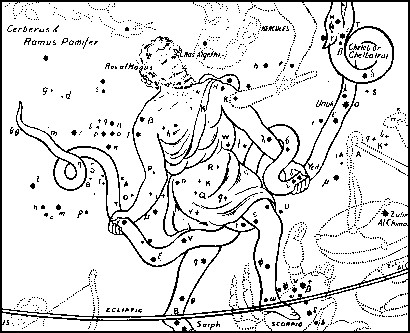
"Here, Serpens, the serpent, is seen struggling vainly in the powerful grasp of the man who is named O-phi-u-chus. In Latin he is called Serpentarius. He is at one and the same moment shown to be seizing the serpent with his two hands, and treading on the very heart of the scorpion, marked by the deep red star Antares (wounding)." (Bullinger)
"Coming out of the Arabic into the Greek, the name of Ophiuchus is Aesculapius. Aesculapius was one of the favorites of the Greek gods, a son of Apollo. Homer describes Aesculapius with all of the attributes of a man. He was a god-man. If you read of the death of Socrates, as described by Plato, you will notice the last request Socrates makes is to ask Crito, his friend, to repay a cock he owes to Aesculapius. Here was a god who was much on the mind of the great Socrates, even at the moment of his death.
"According to Greek mythology, he was the healer; he cured the sick. He was also reported to bring the dead back to life by means of blood taken from the side of the goddess of justice. He is called the 'Physician,' 'The Desired One,' 'The Health-Giver,' the 'Universal Remedy.' Finally, he suffered death from the lightnings of Heaven, but was raised from death to glory through the influence of his father, Apollo." (Kennedy)
The constellation Scorpio lies just beneath the foot of Ophiuchus, a man who holds a serpent. The name Ophiuchus is derived from the Greek words ophis (serpent) and cheiro-o (to handle) - hence, the Serpent Holder. Concerning the Hand of Ophiuchus, Richard Allen wrote ominously in his book, Star Names: Their Lore and Meaning: "ε was the Euphratean Nitax-bat, the Man of Death. Coincidentally, 'in modern astrology, which contained some singular survivals, the Hand of Ophiuchus is said to be a star 'of evil influence'." (927:302)
In Greek mythology, Ophiuchus is associated with Aesculapius, the son of the god Apollo and a mortal woman called Coronis. After Coronis died in childbirth, Aesculapius was reared by Chiron, the Centaur who taught him the art of healing. Aesculapius, supposedly the first doctor of medicine, not only learned to heal, but he also developed the ability to restore the dead to life. The pagan myth of Aesculapius is one of many which claim that the Hermetic arts and sciences were taught to men by the ancient gods.
"[Ophiuchus] is said to be Asclepius, whom Zeus placed among the stars to oblige Apollo. For Asclepius used his healing art to raise the dead... Ophiuchus was usually identified with Asclepius by both Greek and Roman authors... According to tradition, Asclepius was the son of Apollo and Coronis and was reared by Chiron, who instructed him in the art of healing."(570:141)
The famed Greek physician, Hippocrates, belonged to a family which claimed descent from Aesculapius. The original Hippocratic oath opened with an invocation of four Greek divinities: “I swear by Apollo the physician, by Asclepius, Hygeia, and Panacea, and I take to witness all the gods, all the goddesses, to keep according to my ability and my judgment the following oath.” Hygeia and Panacea were the daughters of Aesculapius; their names live on today in medical terminology as hygiene and panacea, which once meant magical potion. Occultists believe that Ophiuchus received the secret elixir of restoring life to the dead from a serpent. Pagan cults such as the Ophites worship this serpent as the giver of eternal life:
"The biblical school made [Serpens] the seducer of Eve, while in our day imaginative observers find another heavenly Cross in the stars of the head, one that belongs to Saint Andrew or Saint Patrick. Serpens shared with Ophiuchus the Euphratean title of Nutsirda, the Image of the Serpent; and is supposed to have been one of the representatives of divinity to the Ophites the Hivites of Old Testament times." (927:375)
Having received the elixir of life from Serpens, Ophiuchus, the Serpent-Holder, is said to restore the constellation Orion to life after he sets in the west, Orion having previously been wounded by Scorpio:
"Scorpius stung Orion and he fell mortally wounded. This act is represented in the sky movement of these two constellations. When Orion, mortally wounded, sets in the west, the Scorpion is just rising in the east, gloating over the success of his mission. Scorpius' triumph does not last long, however, for the next evening - as Scorpius sets in the west - Ophiuchus stands above Scorpius and tramples him to death. Ophiuchus then gives Orion a sip of his elixir and restores Orion to life. Thus Orion is seen to rise in the east again as both Ophiuchus and Scorpius descend in the west." (833) (Ophiuchus)
The staff of Aesculapius, around which a serpent is coiled, is today the symbol of the American Medical Association and the World Health Organization. This symbol is also suggestive of the Serpent who wrapped himself around the Tree of Knowledge in the Garden of Eden!
The Staff of Aesculapius evolved into the Caduceus, which was a magic healing wand with twin serpents entwined around a phallic rod. This wand belonged to Hermes, who is the Greek analogue of the Egyptian god, Thoth, founder of alchemy and sacred geometry. |
|
THE CADUCEUS |
Once again we find the motif of twins that is a recurring theme in the secret doctrine. The twin serpents of the caduceus symbolize the kundalini force that travels along the spinal column and facilitates out of body experiences. Interestingly, the twin serpents also had the power to effect sex changes:
"The mythical origin of his magic twin serpent caduceus is described in the story of Tiresias. Poulenc, in 'Les Mamelles de Tiresias' (The Breasts of Tiresias) tells how Tiresias--the seer who was so unhelpful to Oepidus [sic] and Family--found two snakes copulating, and to separate them stuck his staff between them. Immediately he was turned into a woman, and remained so for seven years, until he was able to repeat his action, and change back to male. The transformative power in this story, strong enough to completely reverse even physical polarities of male and female, comes from the union of the two serpents, passed on by the wand. Tiresias' staff, complete with serpents, was later passed on to Hermes... "Occult Hermetic Connection: An occult description of the Caduceus of Hermes (Mercury) is that the serpents may represent positive and negative kundalini as it moves through the chakras and around the spine (the staff) to the head where it communicates with MIND by intellection, the domain of Mercury [wings]. "Caduceus Power Wand: This wand is sold at occult, new age & witchcraft stores such as Abaxion with descriptions such as 'It's central phallic rod represents the potentiality of the masculine, and is intimately surrounded by the writhing, woven shakti energies of two coupling serpents. The rod also represents the spine [sushumna] while the serpents conduct spiritual currents [pranas] along the ida and pingala channels in a double helix pattern from the chakra at the base of the spine up to the pineal gland'. "According to occultists, there are three principal nadis (Sanskrit for channel) in the human body. The sushumna (the spinal column through which the life-forces flow), by which means we enter and leave the body, the Ida (refreshment and stimulation of spirit), which is associated with the higher mind or manas and the Pingala, (reddish-brown), associated with kama or the force of desire. (G. de Purucker 'Man in Evolution' ch. 15 & 16; and 'Fountain-Source of Occultism', pp. 458-63)." (1005)Quetzalcoatl was the supreme deity of the Mayas and Aztecs and among the numerous twin gods in the pantheons of dualistic mythologies. As the Feathered Serpent-God of ancient Mexico and most famous of the gods of the New World, Quetzalcoatl reigned over a Golden Age of peace and abundance. As a celibate demi-god, he invented the Mayan and Aztec calendar and bequeathed the secret doctrine to his priests, who were also celibate. Quetzalcoatl was driven away on a serpent boat by his evil twin, Tezcatlipoca (the black twin), but is expected to return from the East (where he spread his knowledge of science and the arts) to reclaim his power among the Mesoamerican people. The name Quetzalcoatl means 'precious twin' as well as 'feathered serpent'. Based on the prevalence of twin serpent-gods in ancient cultures, it is possible that the twin snakes of the caduceus may also represent the concept of divine twins. |
|
Quetzalcoatl's name among the Incas was Viracocha, another dualistic deity, the sun and the moon god combined.
"There is a pre-Incan legend that speaks of Viracocha who is depicted in many forms. There is a duality about this deity, which is not unlike gods in other civilizations - the good god and the warrior side to his personality. We see him as the enlightened god in the white robes who brings knowledge and the warrior god with staves in his hands and a sun symbol around his head, not unlike the sun god Ra in ancient Egypt. As the third dimension is a duality - all things have good and evil characteristics - including the gods of all myths. Viracocha - as duality is depicted as the sun god of creation [wearing a sun crown] and the moon god.
"Viracocha, as the feathered serpent god, is one of the great mysteries of ancient American cultures. He was called Kukulkan by the Mayas, Quetzalcoatl by the Aztecs, Viracocha by the Incas, Gucumatz in central America, Votan in Palenque and Zamna in Izamal." (1012)
There is also an association between Viracocha and Osiris who, it is claimed, ruled the world during the First Time: "Several authors have speculated upon the mythological connection between the Egyptian god Osiris, and the god Viracocha, of the people of Central Andes. Osiris is believed to have traveled around the globe bringing civilization to many nations... He was tall, of pale complexion, bearded and dressed in a long white robe." (607:286)
In his book, From Atlantis to the Sphinx, Colin Wilson observed other analogous deities: "The stories of the fish-god Oannes sound curiously like those of Viracocha and Kon-Tiki [Polynesian sun god]." (1014:149) Ralph Woodrow stated in Babylon Mystery Religion that Oannes was later venerated as John the Baptist, the Templars' messiah instead of Jesus. This would explain why the esoteric name of Grand Masters of the Prieuré de Sion has historically been John/Jean:
"Besides the fire ceremony that was observed on June 24, this day was also known among those heathen tribes as the festival of water. And had not John the Baptist been especially known as the one that baptized with WATER? And so this slight similarity helped disguise the continuation of the pagan day, now renamed.
"But the real significance that connected this day with water was that it was sacred to OANNES, the ancient fishgod! Stemming from another anicent Babylonian fable, as we mentioned earlier, Nimrod was supposed to have reappeared in the 'Mysteries' after he was slain as OANNES. In an article on Nimrod, Fausett says: 'Oannes the fishgod, Babylon's Civilizer, rose out of the red sea,'... And so we see how Nimrod, water, and the fish-god Oannes were all connected. Now in the Latin language...John was called Joannes. Notice how similar Joannes is to Oannes! And so...another pagan day was smoothly adopted...disguised with the name of John the Baptist." 494:167
'Jean' is the French variant of 'John' and 'Janus' as Ean Begg states in The Cult of the Black Virgin: "Janus is one of the most important Roman gods. His two faces illustrate not only his role as deity of beginnings, looking to past and future, but his essential duality as the original bisexual chaos and the form which emerged from it. Diana/Jana and Saturn are especially associated with him. He may have been Gallicized into Jean (John), one of the companions to the Black Virgin." (272:7)
Moreover, Janus was represented as a serpent: "Macrobius quotes Cicero (De Natura Deorum 2.27.67), who says Ianus (Janus) was originally called Eanus, which is derived from eundo (going), because Janus, who is the Universe, is always moving, whirling in a circle... This is the reason, he says, that the Phoenicians represent Janus by the Ouroboros serpent." (983)
Hippolytus wrote in his Refutation of All Heresies: "The Assyrians say that fish-eating Oannes was (the first man...)..." (1015) Considering that Oannes and Osiris, which are probably pagan names for Adam (132:81), are also identified as Viracocha, the sun-god of the Incas, it is interesting to note in the photos below the identical hand positions of Pierre Plantard and the stele [stone pillar] representation of Viracocha. This positioning of the hands is precisely the same as certain French Black Madonnas pictured in the section, Virgo in Anticrist!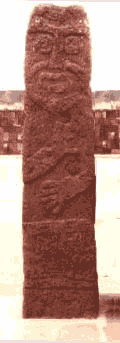

H.P Blavatsky associated Quezalcoatl, the serpent god, with Ham and Canaan, the Dragon race, known in medieval Europe as the Merovingian dynasty.
"Dr. Bourbourg hints that the chiefs of the name of Votan, the Quetzo-Cohuatle, or serpent deity of the Mexicans, are the descendants of Ham and Canaan. 'I am Hivim,' they say, 'Being a Hivim, I am of the great race of the Dragon (snake). I am a snake myself, for I am a Hivim.' And des Mousseaux, rejoicing because he believes himself fairly on the serpent's, or rather, devil's trail, hurries to explain: 'According to the most learned commentators of our sacred books, the Chivim or Hivim, or Hevites, descend from Heth, son of Canaan, son of Ham...the accursed!'" (195:554,Vol.I)
The Serpent Holder of medieval times was claimed to have been St. Benedict, another celibate and a Merovingian who founded the monastic Benedictine Order for the purpose of infiltrating and controlling the Roman Catholic Church: "...Julius Schiller...made of [Ophiuchus] Saint Benedict in the midst of the thorns, for it was this founder of the order of the Benedictine monks, who, with his followers in the 6th century inspired and carried on all the learning of the times, as Aesculapius-Ophiuchus had done in his day." (927:299) Like Quetzalcoatl, St. Benedict is credited with preserving the Hermetic arts and sciences during the period when the Roman Church dominated Western civilization and persecuted aberrant sects which spread the Gnostic heresy. (The reader is hopefully beginning to understand the true character of certain adversaries of the Church of Rome during the Middle Ages.)
At this point we shall venture to interpret the symbolism of the hand position of Viracocha, who appears to be embracing himself! As stated, Viracocha, the serpent god was celibate, as was St. Benedict, who was Ophiuchus, the Serpent-Holder of his era. An article by Peter Jones titled "Androgyny: The Pagan Sexual Ideal" documents that the ancient goddesses required their priests to emasculate themselves in varying degrees:
"Throughout time and across space, the pagan cultus consistently, though not exclusively, holds out as its sexual representative the emasculated, androgynous priest.... Androgynous priests were associated with the worship of the goddess Istar from the Sumerian age (1800 BC)... Examples of 'religious' androgyny can be found in various forms in Syria and Asia Minor in the third century B.C., but its clearest and closest expression in that area comes from the Roman Empire at the beginning of the Christian era. It is well documented that the Great Mother under the names of Atargatis or Cybele had androgynous priests, called Galli, who castrated themselves as a permanent act of devotion to the goddess. A particular version of the goddess is worshipped under the name of Artemis at Ephesus where Paul established a church (Acts 19). In Syria, Cybele is called Rhea, whose effeminized itinerant priests imitated the deeds of the mythological Attis, in trance-like ecstasies... The obvious intentions and results of such cultic mythology and practice were the feminization and emasculation of men under the occultic power of the goddess...
"At the beginning of the fifth century AD the cult of the goddess Cybele continued to have success. Augustine in his City of God vividly describes the 'games' offered in honor of Tanit, the celestial 'virgin' and mother of the gods, where obscene actors role-played disgusting acts 'in the presence of an immense throng of spectators and listeners of both sexes.' He also describes the public display of homosexual priests (galloi)... [T]he Mesopotamian assinnus, the Canaanite qedeshim, the Scythian ennares, and the Syrian galli ...took on the same androgynous appearance, engaged in the same ecstatic behavior, including self-mutilation, were associated with occultic spirituality, and so in many ways occupied a similar liminal relationship to 'normal' society." (1073)
What was the pagan rationale for an androgynous priesthood? The Encyclopedia of Religion gives some insight into androgyny and its appeal to pantheists of all ages: "Many myths point out that the permanently fused androgyne is, technically, the one creature in the world who is certain to be unable to copulate. As Alan Watts has remarked, the androgyne symbolizes a state 'in which the erotic no longer has to be sought or pursued, because it is always present in its totality'." (146:278) "Androgynes"
Monism, meaning 'single,' is a pantheistic conception of the world as opposed to 'dualism,' the good vs. evil heresy discussed above. Monism reduces all phenomena to one principle; therefore, the whole of reality constitutes one inseparable and indivisible entirety. It is from the Greek word "monism" that the terms "monk" and "monastic" were derived. Peter Jones observed that monastic celibacy was the Gnostic corollary to the pagans' androgynous priesthood:
"Later in the second and third centuries of the Christian church, the Gnostics were credited by their adversaries with mystery celebrations involving carnal knowledge. The charge is credible because 'Christian' Gnosticism was the attempt to Christianize pagan spirituality, even to the point of adopting some form of androgyny. In the ancient Gnostic texts such connections can be detected. The Church Father Hippolytus, documents how and why the 'spiritual' Gnostics did not hesitate to imitate pagan spirituality and sexuality in one form or another. He explains the Gnostic Naasene participation in the cult of the Goddess. 'Because they claimed that everything is spiritual,' the Naasenes did not become Galli physically but rather spiritually: 'they only perform the functions of those who are castrated' by abstaining from sexual intercourse. So, concludes Hippolytus, the Naasene Gnostics imitate the Galli, the castrated priests of Cybele. 'For they urge most severely and carefully that one should abstain, as those men (the Galli) do, from intercourse with women; their behavior otherwise...is like that of the castrated.' The mythological story of the castration of Attis thus led the Naasenes to conclude that the image of emasculation was a symbol of salvation. Attis cut off his testicles in order to 'break with the baser and material world and gain access to immortal life, where there is no longer either male or female.' These 'Christian' Gnostics sought, through a deep form of spiritual androgyny, a close association with paganism's understanding of salvation." (1073)Dropping the Frame
In 1604, at the height of the 17th century Rosicrucian Enlightenment (when the the authority of the Roman Church over Europe had been significantly undermined by the Reformation) a Supernova appeared in the constellation of Serpentarius. This spectacle was noted by Peter Dawkins in The Great Vision: The Judaic-Christian Mysteries: The Vision and Birth of the New Rosicrucianism:
"A supernova is a star which explodes catastrophically, with a sudden liberation of most of its energy and the dissipation of nearly the whole mass of the star into space. Its explosion appears to us about ten thousand times as bright as an ordinary nova. The only supernovae observed in our Galaxy during the past thousand years occurred in A.D. 1006 (in Lupus), 1054 (in Taurus), 1572 (in Cassiopeia), and in 1604 (in Ophiuchus). All reached apparent magnitudes considerably brighter than zero, releasing as much energy in one second as our Sun does in sixty years... All of them are present-day radio sources." (902:69)
The 1572 supernova in Cassiopeia, which had preceded Serpentarius, was recognized by Rosicrucians as a "portent of some convulsive change in the order of the world...the entrance of the world into the seventh revolution that would inaugurate the golden age." (Ibid.) In her book The Rosicrucian Enlightenment, Frances Yates cited the Rosicrucian manifesto, Confessio Fraternatis, which attached similar importance to the 1604 supernova in Serpentarius (Ophiuchus/ Serpent Holder) as heralding the Golden Age to come:
"...before the end, God will allow a great influx of truth, light, and grandeur, such as surrounded Adam in Paradise, to be poured forth on mankind. New stars have appeared in the constellations Serpentarius and Cygnus which are signs of the coming of these things...
"...a representation of the Invisible College of the R.C. Brothers...[illustrates] in the sky...a Serpent and a Swan, bearing stars and alluding to the 'new stars' in Serpentarius and Cygnus mentioned in the Confessio as prophetic of a new dispensation...
"'...the Lord God hath already sent before certain messengers, which should testify his will, to wit, some new stars, which do appear and are seen in the firmament in Serpentino and Cygno, which signify and give themselves known to everyone, that they are powerful Signacula of great weighty matters.'" (Confessio Fraternitatis) (46:48,94,256)
According to The Guinness Book of Answers, "Ophiuchus is considered by European astrologers to be not so much the 13th sign as the second half of the sign of Scorpio." (982) The Constellations website confirms that "Out of the twenty-five days, from the 21st of November to the 16th of December, which the sun spends in passing from Libra to Sagittarius, only nine are spent in the Scorpion, the other sixteen being occupied in passing through Ophiuchus". (833) Richard Allen Hinckley indicates that Ophiuchus seems to have greater claim to a place in the Zodiac than does Scorpio: "Although nominally in the zodiac, the sun actually occupies but nine days in passing through the two portions [of Scorpio] that project upward into Ophiuchus, so far south of the ecliptic is it; indeed, except for these projections, it could not be claimed as a member of the zodiac." (927:364)
VIRGO: THE DIVINE ANDROGYNE |
LIBRA: EQUALITY & FRATERNITY |
SCORPIO: THE SERPENT HOLDER |
SAGITTARIUS: GATE OF THE GODS |
CAPRICORN: THE SEA BEAST |
TAURUS: ORION, THE STARGATE |
GEMINI: THE DIVINE TWINS |
CANCER: HEAVEN'S GATE |
LEO: THE LION KING |

